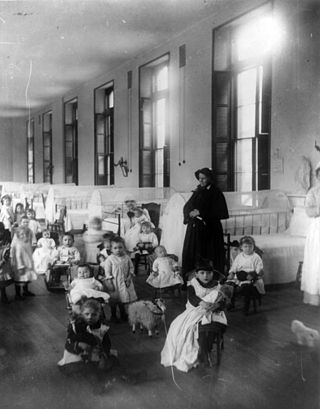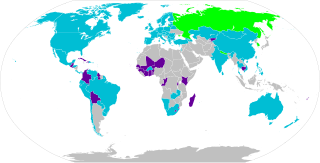Related Research Articles

Adoption is a process whereby a person assumes the parenting of another, usually a child, from that person's biological or legal parent or parents. Legal adoptions permanently transfer all rights and responsibilities, along with filiation, from the biological parents to the adoptive parents.
Same-sex adoption is the adoption of children by same-sex couples. It may take the form of a joint adoption by the couple, or of the adoption by one partner of the other's biological child.
International adoption is a type of adoption in which an individual or couple residing in one country becomes the legal and permanent parent(s) of a child who is a national of another country. In general, prospective adoptive parents must meet the legal adoption requirements of their country of residence and those of the country whose nationality the child holds.
Embryo donation is one disposition option for users of in vitro fertilisation with remaining fresh or frozen embryos. It is defined as the giving—generally without compensation—of embryos remaining after in vitro fertilization procedures to recipients for procreative implantation or research. Most IVF users with supernumerary embryos make embryo donation decisions after completing their families or discontinuing use of in vitro fertilization. Recipients of embryos donated for procreative implantation typically plan to transfer fresh or frozen embryos into a prepared uterus in order to facilitate pregnancy and childbirth. Recipients of embryos donated for research typically use them for clinical training, quality improvement research, or human embryonic stem cell research.

Trafficking of children is a form of human trafficking and is defined by the United Nations as the "recruitment, transportation, harboring, and/or receipt" kidnapping of a child for the purpose of slavery, forced labour, and exploitation. This definition is substantially wider than the same document's definition of "trafficking in persons". Children may also be trafficked for adoption. Not all adoption is a form of human trafficking, but illegal or informal is. Illegal adoptions violate multiple child rights norms and principles, including the best interests of the child, the principle of subsidiarity and the prohibition of improper financial gain.
In the United States, adoption is the process of creating a legal parent–child relationship between a child and a parent who was not automatically recognized as the child's parent at birth.
Open adoption is a form of adoption in which the biological and adoptive families have access to varying degrees of each other's personal information and have an option of contact. While open adoption is a relatively new phenomenon in the west, it has been a traditional practice in many Asian societies, especially in South Asia, for many centuries. In Hindu society, for example, it is relatively common for a childless couple to adopt the second or later son of the husband's brother when the childless couple has limited hope of producing their own child.
Interracial adoption refers to the act of placing a child of one racial or ethnic group with adoptive parents of another racial or ethnic group.

David Mark Smolin is a professor of law at Cumberland School of Law in Birmingham, Alabama where he is the Harwell G. Davis Chair in Constitutional Law, director for The Center for Children, Law, and Ethics, former director of the Center for Biotechnology, Law, and Ethics, and faculty advisor for the Law, Science and Technology Society.
Pregnancy options counseling is a form of counseling that provides information and support regarding pregnancy. Women seeking pregnancy options counseling are typically doing so in the case of an unplanned or unintended pregnancy. Limited access to birth control and family planning resources, as well as misuse of birth control are some of the major contributing factors to unintended pregnancies around the world. In 2012, the global rate of unintended pregnancies was estimated to be 40 percent, or eighty-five million pregnancies.

Same-sex parenting is the parenting of children by same-sex couples generally consisting of gays or lesbians who are often in civil partnerships, domestic partnerships, civil unions, or same-sex marriages.
The China Center of Adoption Affairs (CCAA) was established on June 24, 1996 by China's Ministry of Civil Affairs. The CCAA is responsible for the welfare of children in the care of Child Welfare Institutes (orphanages), domestic adoption, and international adoption.
Child laundering is a tactic used in illegal or fraudulent international adoptions. It may involve child trafficking and child acquisition through payment, deceit or force. The children may then be held in sham orphanages while formal adoption processes are used to send them to adoptive parents in another country.

A same-sex relationship is a romantic or sexual relationship between people of the same sex. Same-sex marriage refers to the institutionalized recognition of such relationships in the form of a marriage; civil unions may exist in countries where same-sex marriage does not.

The Hague Convention on Protection of Children and Co-operation in Respect of Intercountry Adoption is an international convention dealing with international adoption, child laundering, and child trafficking in an effort to protect those involved from the corruption, abuses, and exploitation which sometimes accompanies international adoption. The convention has been considered crucial because it provides a formal international and intergovernmental recognition of intercountry adoption to ensure that adoptions under the convention will generally be recognized and given effect in other party countries.
Adoption in Australia deals with the adoption process in the various parts of Australia, whereby a person assumes or acquires the permanent, legal status of parenthood in relation to a child under the age of 18 in place of the child's birth or biological parents. Australia classifies adoptions as local adoptions, and intercountry adoptions. Known child adoptions are a form of local adoptions.
Homosexuality, as a phenomenon and as a behavior, has existed throughout all eras in human societies.
The following outline is provided as an overview of and topical guide to adoption:

Adoption in the Philippines is a process of granting social, emotional and legal family and kinship membership to an individual from the Philippines, usually a child. It involves a transfer of parental rights and obligations and provides family membership. The Department of Social Welfare and Development (DSWD) defines adoption as a "socio-legal process of giving a permanent family to a child whose parents have voluntarily or involuntarily given up their parental rights."
Surrogacy is legal in New Zealand if it is performed altruistically, where the surrogate donates her services selflessly, without any compensation beyond the coverage of expenses. Commercial surrogacy, where the surrogate is paid in addition to the coverage of expenses, is not legal. There is a lack of specific legislation and regulations dealing with surrogacy, though the recent increase in surrogacy cases has led to a number of amendments. New Zealand is party to the United Nations Convention on the Rights of the Child, and ratified it in April 1993. The primary principle of this convention is that the best interests of the child are paramount, which must then encompass all surrogacy agreements and regulations. The lack of clear surrogacy legislation in New Zealand has led to many couples engaging in reproductive tourism in order to ensure the surrogacy is successful. This has the potential to significantly impact the human rights of all of the parties involved.
References
- ↑ J. H. M. van Erp, Lars Peter Wunibald van Vliet Netherlands Reports to the Seventeenth International ... 2006 - Page 100 "... legal rules applying to adoption (step-parent adoption, adoption by cohabitees, adoption by single parents and same-sex parents) as well as with regard to the nature of adoption (intercountry adoption versus national adoption).... "
- ↑ Cynthia R. Mabry, Lisa Kelly Adoption Law: Theory, Policy and Practice -- 2006 - Page 459 "Some prospective adoptive parents choose certain countries because the country's adoption laws are more favorable to foreign adopters. Other prospective parents choose a particular country because more infants are available immediately."